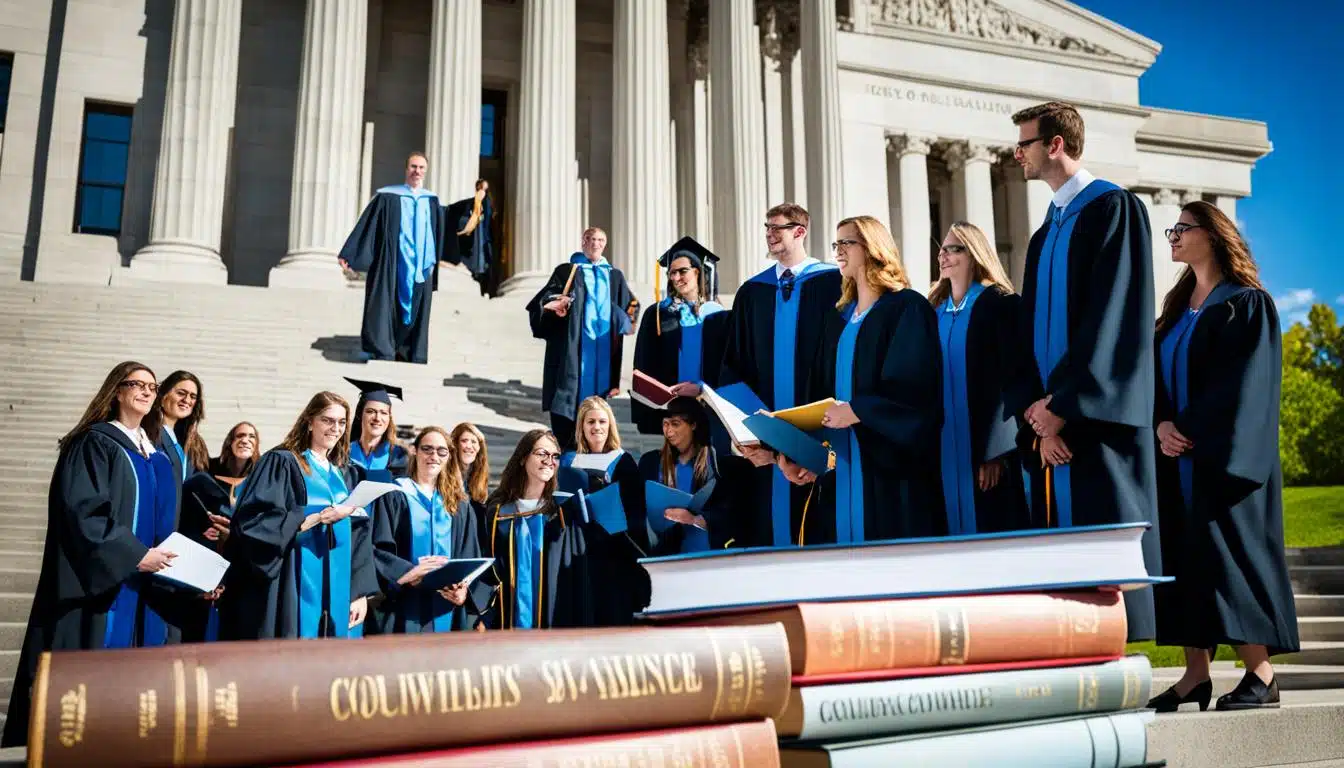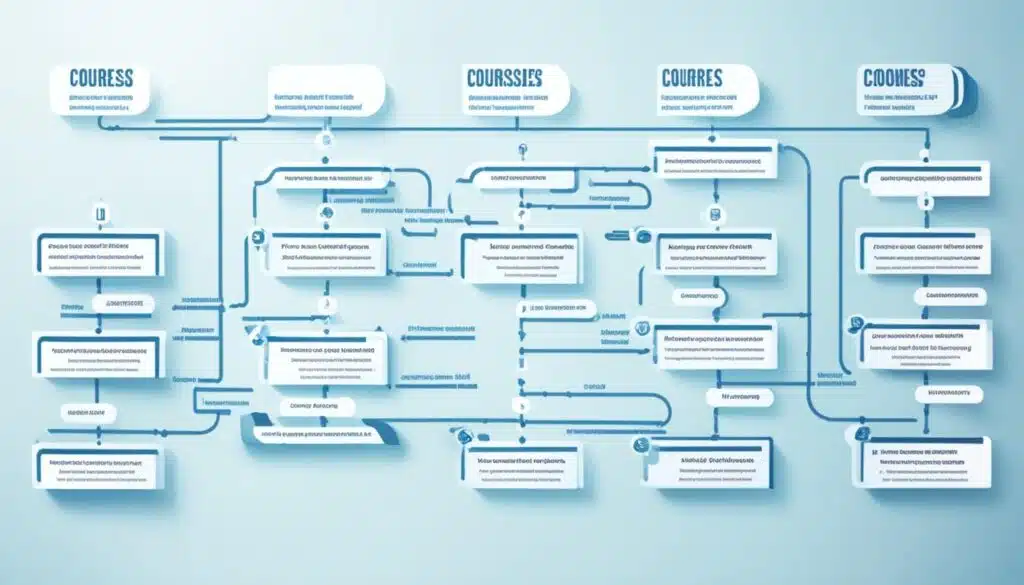The United States’ legal education system is a challenging yet rewarding path for those dreaming of becoming lawyers. This journey has seen many changes over the years. It grew from simple apprenticeships to the complex curriculum of today’s law schools. These changes have greatly influenced how law shapes society.
Law schools, whether public or private, form the core of legal education. Each one has its own style and benefits. The American Bar Association ensures they meet high standards. Getting into these schools requires good undergrad performance, tackling the LSAT, and meeting other application demands.
The courses at law schools aim to deeply educate students on the law and arm them with crucial skills. Professors are key in crafting this academic experience. They use top-notch teaching, do groundbreaking research, and work hard to make the school a diverse and welcoming place.
But education doesn’t stop in the classroom. Legal studies also include hands-on learning like clinical programs and externships. These experiences are vital for students to test their skills in real-life situations. Then comes the bar exam, a big step every future lawyer must pass to start their career.
For those who want to dive even deeper, there are postgraduate options like the Master of Laws (LL.M.) and Doctoral (J.S.D.) programs. The legal education field values ongoing learning and professional growth too.
Today, the legal education system faces unique challenges and exciting chances for growth. It must work towards a more inclusive environment and keep up with new technologies. The goal is to ensure future legal professionals are well-equipped for the complexities of the modern era.
Also Read : Essential MBA Scholarships For Future Education
Key Takeaways
- The legal education system in the United States is a structured and rigorous pathway for aspiring lawyers, involving a bachelor’s degree, the LSAT exam, a 3-year law school program, and passing the bar examination.
- Law schools in the US can be either public or private, each with their own unique characteristics and funding models, and are accredited by the American Bar Association (ABA).
- The curriculum at law schools is designed to provide comprehensive legal knowledge and essential skills, with a focus on teaching methodologies, clinical programs, and experiential learning.
- Professors and faculty play a crucial role in shaping the legal education experience, through their teaching, research, and commitment to diversity and inclusion.
- The legal education system in the US extends beyond the Juris Doctor (J.D.) degree, with opportunities for postgraduate specializations and continuous professional development.
Introduction to the Legal Education System
The legal education system in the United States has changed a lot. In the past, people who wanted to be lawyers learned through working with experienced attorneys. They didn’t go to formal law schools. The Litchfield Law School, started in 1784, was the first step towards more structured legal education in the US.
Also Read : Top MBA Scholarships For Business Students
Historical Development of Legal Education
With the country’s growth came a need for a better legal education system. During the 1800s and 1900s, more law schools started offering degrees. The American Bar Association set standards for these schools. They played a key part in the historical development of legal education systems.
Importance of Legal Education in Society
Legal education is crucial for those wanting to work in the legal field. Lawyers help with various legal issues in society. Law schools provide a tough academic program and training. They give students the know-how and skills needed in the legal world.
But, legal education in society isn’t just for lawyers. Those with a legal education work in many areas. These include government, business, and nonprofits. The legal education systems around the world keep changing. They handle new issues, shaping the legal field’s future.
Also Read : Top International PHD Scholarships
Types of Law Schools: Public vs. Private
In the United States, there are two main types of law schools: public and private. Public law schools are usually part of state universities. They are cheaper, especially for people who live in that state. This is because the schools get money from the state. They help make legal education available to more people. They also work to make the legal field more diverse and inclusive.
On the flip side, private law schools work on their own. They cost more but might offer more unique programs or facilities. They focus on using innovations and technology in legal education. This meets the changing needs of the legal sector. Rankings are important for both types of schools. They affect how future students choose and get financial aid.
| Characteristic | Public Law Schools | Private Law Schools |
|---|---|---|
| Affiliation | State universities | Independent institutions |
| Tuition Costs | More affordable, especially for in-state residents | Generally higher tuition fees |
| Specialization | Focus on providing a broad, comprehensive legal education | May offer more specialized programs or resources |
| Funding and Financial Aid | Benefit from state funding and subsidies | Rely more on private funding sources and scholarships |
| Diversity and Inclusion | Strive to promote access and representation | May have varying levels of diversity and inclusion initiatives |
| Law School Ranking | Ranked based on various factors, including cost and accessibility | Ranked based on factors such as reputation, resources, and outcomes |
Students need to consider their goals and budget when choosing between a public or private law school. Knowing the differences helps aspiring lawyers pick the school that fits their needs. It’s a key decision for their future career in law.
Also Read : Exclusive MBA Scholarships For High Achievers
Accreditation and Standards in Legal Education
The American Bar Association (ABA) is key in setting standards and accrediting law schools in the U.S. It’s made up of lawyers and law students. They set the rules for education and what lawyers need to know.
Role of the American Bar Association (ABA)
The ABA’s Council checks and approves law schools. It makes sure schools meet high accreditation and standards in legal education. They watch over what schools teach, who teaches, and what the school has for students.
The ABA’s stamp of approval, its accreditation, is very important. Many law students and future employers look for it. It means you’re getting a good education. The ABA also works to make sure law schools are open to everyone.
Also Read: Best International MBA Scholarships
Accreditation Process and Requirements
Law schools have to meet many rules to keep their ABA approval. These rules cover what’s taught, who teaches, and what students have to study.
- Offering a curriculum that provides students with a well-rounded legal education, including coursework in fundamental legal subjects, research and writing skills, and professional responsibility.
- Maintaining a qualified and experienced faculty, with a sufficient number of full-time professors to support the school’s academic programs.
- Providing adequate library resources, facilities, and technology to support student learning and research.
- Demonstrating a commitment to diversity and inclusion in their student body, faculty, and staff.
- Ensuring financial stability and responsible management of the institution’s resources.
Getting that ABA approval means a school is giving a high-quality education. The ABA looks at everything in a school, like its programs and teachers. Schools must pass regular checks to keep their ABA approval.
Admissions Process for Law Schools
Getting into a law school in the United States is tough but doable with proper preparation and strong grades. In the U.S., there’s no direct path to law school after high school. Students must first earn a bachelor’s degree.
Undergraduate Preparation
What you study as an undergrad is important for law school admission. Admissions boards like to see students who are well-rounded with various skills. Majors such as political science, history, English, and economics are popular choices because they aid in critical thinking and writing.
Law School Admission Test (LSAT)
The LSAT is a key part of the law school application. It tests reading and logic skills. Doing well on the LSAT can boost your chances of getting into the law school of your choice.
Application Requirements
Law schools also need a detailed application, a personal statement, letters of recommendation, and a resume. When applying, students should look at school rankings and the support they offer. This includes how they fund and aid law students.
Curriculum Design and Course Offerings
At American law schools, the curriculum teaches students all about the law. It also helps them think critically and solve problems. In the first-year curriculum, students learn about key areas like contracts, torts, property, civil procedure, criminal law, and constitutional law. These courses are the foundation. They help students build their legal knowledge and think more analytically.
Upper-Level Courses and Concentrations
After the first year, students can pick specialized areas of the law that interest them. Schools offer lots of upper-level courses and concentrations. For example, they might check out corporate law, intellectual property, international law, criminal justice, and environmental law. This lets each student follow their passion and their desired career route.
Clinical Programs and Experiential Learning
Law schools also focus on practice and real-life experiences. They offer clinical programs and experiential learning. These include legal clinics, externships, and simulated courtroom exercises. Students get real chances to use what they’ve learned and build practical skills. This helps them work on their legal research skills, legal writing abilities, and ethical decision-making. It’s all about getting ready for being a real lawyer.
The Role of Professors and Faculty in Legal Education
Law school professors shape the legal education experience for students in unique ways. Lectures and textbooks aren’t as common here. Instead, teaching is interactive and discussion-based, using the Socratic method. This approach makes students actively think, improving their critical thinking and legal writing skills.
Teaching Methodologies
Law professors use many teaching styles to make sure students understand the law. They use case-based learning, which involves looking at real legal cases. Students also take part in simulations and moot court experiences. This means practicing law in mock trials and appeals.
Scholarly Research and Publications
Teaching is not their only job; they also do scholarly research and publications. Their research adds to legal pedagogy and legal ethics discussions. It helps improve the law curriculum too.
Law school faculty diversity is key for a complete legal education. It brings together different backgrounds and viewpoints. This prepares students for the complex and ever-evolving legal landscape.
Legal Education System
In the United States, the Juris Doctor (J.D.) degree is key to legal education. It takes three years after your bachelor’s to finish. You study many laws, like constitutional law and criminal procedure. After your J.D., you can take the bar exam to practice law in most states.
Juris Doctor (J.D.) Degree Programs
J.D. programs aim to make students skilled and ethical legal pros. You learn a lot about the law. This includes civil and criminal law, writing, and talking like a lawyer. It gets you ready for working as a lawyer.
Master of Laws (LL.M.) and Doctoral (J.S.D.) Programs
For those who finish the J.D., more study is available. There’s the Master of Laws (LL.M.) and Doctor of Juridical Science (J.S.D.). These are for specializing in law or doing deep research. LL.M. lets you dive into tax, international, or business law. J.S.D. is for those who want to teach law or make big legal policies.
These extra study options show how the U.S. legal education system supports lawyers. There are also many ways to keep learning and growing in your legal career. This system makes sure there’s something for every legal pro, from beginners to experts.
Also Read : Why Study Law?
Teaching Methodologies in Legal Education
American law schools use certain teaching methods to prepare students for a legal career. They focus on critical thinking, reasoning, and speaking skills. Key methods include the Socratic method, learning through real cases, and hands-on experiences like moot courts.
Socratic Method
The Socratic method is at the heart of legal education. Professors ask students questions to challenge their understanding. This makes students think critically, analyze court decisions, and learn to argue effectively.
Case-Based Learning
In the U.S., law schools often teach using real legal cases. Students explore these cases to see how the law applies in the real world. This way, they understand the law’s complexities and learn how it’s used in practice.
Simulations and Moot Court Experiences
Many law schools also use simulations and moot courts to sharpen students’ legal skills. Through role plays, students practice interviewing clients and arguing cases. These experiences are key for learning essential lawyer skills like research, writing, and speaking.
FAQs
What is the historical development of the legal education system in the United States?
In the early years, future lawyers would work with experienced lawyers. This was instead of going to law schools. The Litchfield Law School opened in 1784, offering the first structured legal education in the U.S. It marked a shift towards formal legal teaching.
What are the main types of law schools in the United States?
In the U.S., law schools are either public or private. The public ones link with state universities and are cheaper for locals. This is because they receive state funds. Private schools are separate. They cost more but might have unique programs and support.
What is the role of the American Bar Association (ABA) in legal education?
The ABA is vital for law school quality and to protect the public. It sets and checks standards for law schools in the U.S. The ABA, made of lawyers and students, ensures the proper training and ethics for attorneys.
What is the admissions process for law schools in the United States?
Getting into U.S. law schools is tough. It needs good grades and prep. Unlike other places, you can’t study law right after high school. First, you must get a bachelor’s degree.
What is the curriculum like at American law schools?
American law schools offer a full legal education. Students learn law, critical thinking, and solving problems. The main program is the Juris Doctor (J.D.), which lasts three years after a bachelor’s degree.
How do law school professors approach teaching in the United States?
Law professors make learning interactive. They focus on discussions and activities. This approach sharpens students’ critical thinking and speaking skills. It is not just about listening or reading.
What types of teaching methodologies are used in American law schools?
American law schools use teaching to hone skills needed for legal work. These include discussion, the Socratic method, learning from real cases, and role-playing in court settings.
What is the importance of clinical programs and externships in legal education?
Practical learning is key in American legal studies. Clinical programs and externships allow students to work in legal environments. This helps them use what they’ve learned and prepares them for their law careers.
What is the bar exam and how does it fit into the legal education system?
The bar exam is crucial after the J.D. program to start practicing law. It checks graduates’ skills and knowledge. Passing is a big step towards becoming a lawyer in a certain state.
How does legal education in the United States compare to other countries?
The U.S. legal education stands out globally. It focuses on the J.D., the bar exam, and interactive teaching. These methods are different from other countries. American legal education’s design sets it apart.











